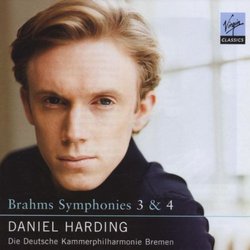| All Artists: Johannes Brahms, Daniel Harding, Die Deutsche Kammerphilharmonie Bremen Title: Brahms: Symphonies #3 & 4 Members Wishing: 0 Total Copies: 0 Label: EMI Europe Generic Release Date: 1/8/2002 Album Type: Import Genre: Classical Style: Symphonies Number of Discs: 1 SwapaCD Credits: 1 UPCs: 724354548024, 724354548055 |
Search - Johannes Brahms, Daniel Harding, Die Deutsche Kammerphilharmonie Bremen :: Brahms: Symphonies #3 & 4
 | Johannes Brahms, Daniel Harding, Die Deutsche Kammerphilharmonie Bremen Brahms: Symphonies #3 & 4 Genre: Classical
|
Larger Image |
CD DetailsSimilar CDs
|
CD ReviewsSheer excellence Jorge Yuri | Perugia, Italy | 10/09/2002 (5 out of 5 stars) "A few weeks ago, I heard a live performance of these two symphonies (the Berlin Symphoniker, under Harding's direction) in my town's theatre and I was so enthusiastic that I ordered them the following day. The orchestra is excellent, and Daniel Harding - who's now only 25 years old - promises to become one of the great conductors of symphonic music, if he keeps it up this way. The fact that this CD pre-dates, of course, that concert shows he has reached a great fusion with the Bremen Philarmoniker. Harding still shows an enthusiastic, youthful display of movements while he's directing, but - after all - so used to do Bernstein in his already mature years (I saw and heard him, directing the Israeli Symphony Orchestra from Tel Aviv, in the same theatre). This, however, cannot be perceived from recorded music. Just relax and enjoy it." A personal fusion of period and Romantic styles--very nice Santa Fe Listener | Santa Fe, NM USA | 06/27/2006 (5 out of 5 stars) "The English wunderkind Daniel Harding has a strong musical personality that will carry him far--he's already attracted the patronage of such lights as Abbado, Rattle, and Boulez--and his taste fuses period and romantic styles. Here we get reduced forces in Brahms Sym. #3 and #4, more in keeping with the modest-sized orchestras that the composer was used to in is lifetime.
Charles Mackerras preceded Harding with that idea; Harding also adds some period style by greatly reducing the vibrato in the string sound and hinting at the swelling dynamics we've gotten used to in period Bach, Handel, and Mozart. Those of us who aren't scholars can only say what our ears enjoy. In this case, Harding's feeling for Brahms is as romantic as anyone short of Furtwangler. He has a natural touch with emotional and melodic shaping, which adds up to truly fresh, eminently enjoyable readings. For its natural musicality, this Brahms Third stands among the great ones. I wasn't that keen on the Mackerras versions because I don't find him an inspired interpreter, but Harding is. In his Third, the winds come through prominently, and the lightness of texture overall is a new experience--fortunately, "Brahms lite" doesn't have to be emotionally stunted. I think most listeners will be engaged by Harding's Third since this work is sunnier than the Fourth and therefore more open to letting extra light in. As for timings, Harding remains within a few seconds of Bruno Walter's famous account with the Columbia Sym. (Sony) except that he cuts a minute off Walter's finale. Since period readings are almost always fast, I was apprehensive about the Fourth Sym., whose deep feelings can't be glossed over. Harding cuts almost 4 min. off the first two movements compared to Carlos Kleiber's famous account on DG, and beautifully as he phrases the music, Harding's performance lacks somethhing of Brahms's stuggle nad heroic victory. The last two movements return to Kleiber's pacing, which was fast for its day thirty years ago. The Scherzo is really deightful here in its vivacity--Harding makes other conductors seem to plod. The great test is the tragic Passacaglia of the finale, and although Harding takes a traditional tempo, he is too formally balanced to sound tragic. I am impressed by his lyrical approach, but this is the lesser of the two readings on this CD. In all, Harding's Brahms has been unjustly overlooked, and I think in the quasi-period style he far outstrips the Mackerras accounts on Tlearc that rceived so much initial publicity. " |

 Track Listings (8) - Disc #1
Track Listings (8) - Disc #1
